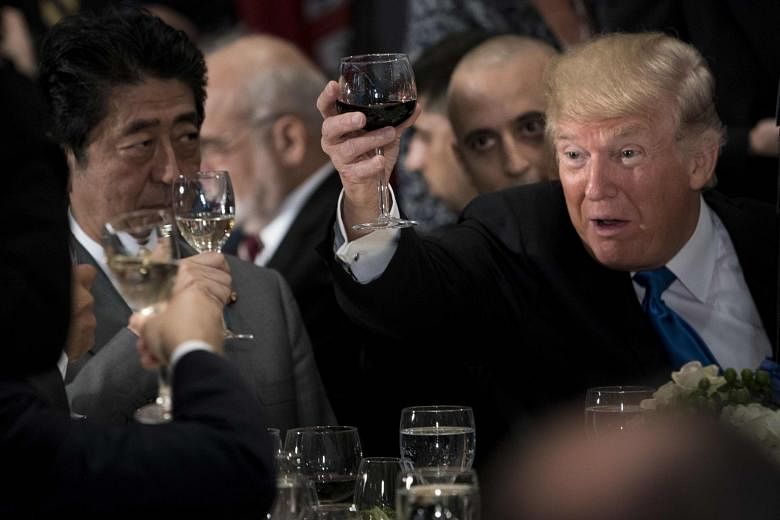WASHINGTON - President Donald Trump's speech at the United Nations has drawn predictable mixed reactions.
The North Korean delegation walked out as he began, leaving only a junior diplomat present. Venezuela's foreign minister rejected "threats" from the "racist" Mr Trump. Iranian President Hassan Rouhani said the US would forfeit the world's trust if it exited its nuclear deal with his country.
Israeli Prime Minister Benjamin Netanyahu on the other hand tweeted: "In over 30 years in my experience with the UN, I never heard a bolder or more courageous speech. President Trump spoke the truth about the great dangers facing our world and issued a powerful call to confront them in order to ensure the future of humanity."
An hour or so after his speech, President Trump took to Twitter to repeat a line that made most of the headlines in the US media: "The United States has great strength & patience, but if it is forced to defend itself or its allies, we will have no choice but to totally destroy #NoKo."
At home the reaction was split along partisan lines. Former Republican presidential nominee Mitt Romney praised Mr Trump for his "strong and needed challenge" to the UN "to live up to its charter and to confront global challenges."
But Democratic Senator Dianne Feinstein in a statement said: "Trump's bombastic threat to destroy North Korea and his refusal to present any positive pathways forward on the many global challenges we face are severe disappointments.
"He aims to unify the world through tactics of intimidation, but in reality he only further isolates the United States."
Dr Mira Rapp-Hooper, of the Centre for a New American Security, warned in a series of tweets that breaking the 2015 Iran nuclear deal would undermine the US as a credible negotiator. The threat to "totally destroy" North Korea was an "unholy choice between a real threat of deliberate war and a reckless gamble that risks horrid miscalculation," she warned.
Noting Mr Trump's opening remarks about economic rebound in the United States, and investment of US$700 billion (S$940 billion) in the military, Dr Inderjeet Parmar, professor of international politics at the City, University of London, said the "tough guy" talk was aimed at his political base.
"This was a domestic speech to an international audience," Dr Parmar said.
Dr Glenn Altschuler, professor of American Studies at Cornell University, told The Straits Times: "Much of what he said was clearly aimed at his domestic audience.
"The 'America First' theme, the military response to North Korea, the likely cancellation of the nuclear deal with Iran, will certainly play well with his base, but are not likely to play well with an international audience."
Analysts noted that Mr Trump used the word "sovereignty" 22 times in his speech, arguing that it was natural for nations to work in their own self-interest, while cooperating to confront threats.
"He is signalling a move towards a more unilateral, narrowly self-interested foreign policy," he added.
Dr Parmar in a phone interview, said President Trump - who has been critical of the UN - seemed to be signalling impatience with the architecture of international institutions, somewhat similar to the sentiment that has driven Britain to break out of the European Union.
"It's almost like saying we want more elbow room," Dr Parmar said. "There's a greater level of nationalism, they want to loosen the bonds of international institutions."
Later on Tuesday, at a lunch hosted by UN Secretary General Antonio Guterres, Mr Trump struck an optimistic note regarding the UN, saying, "For years I've been a critic, but I've also been somebody that said that the United Nations has tremendous potential.
"There can be no better forum. And certainly there can be no better location where everybody comes together. The potential of the United Nations is unlimited, and I really believe... you are going to do things that will be epic, and I certainly hope you will."
Richard Ponzio, a former State Department official now with the Stimson Centre in Washington, told The Straits Times: "The speech did signal a more hard line unilateral stance, but it was reassuring in that it was clear the UN will continue to be engaged as an important part of US foreign policy."
Critics noted that in his speech, there was no mention of the threat of climate change, nor - barring a reference to Ukraine - any mention of Russia, the US' traditional geopolitical rival, whose shadow, in the shape of allegations of interference, continues to cloud President Trump's election victory.
"It could not be clearer that he is not interested in climate change," Dr Altschuler said.
"And as for Russia, the wisest thing for President Trump, is to say and do nothing."


